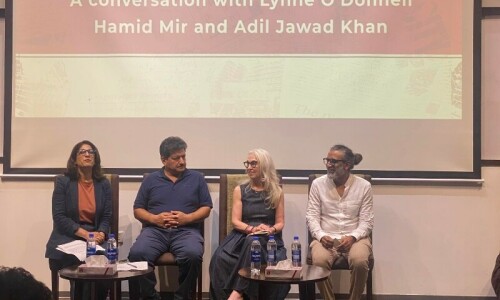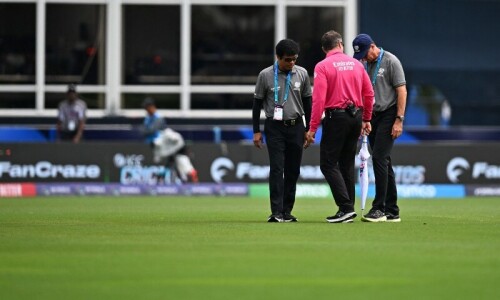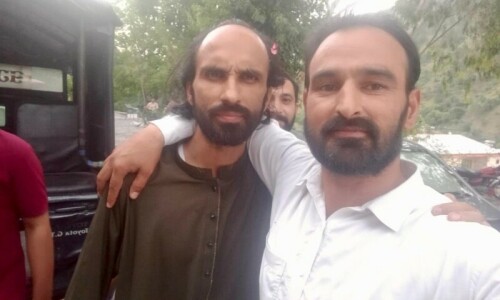MOST in Pakistan would like the government to pursue an independent foreign policy and maintain a deterrent defence force.
But vital as these are for national sovereignty, they cannot be pursued without a strong and stable economy free from the burden of excessive external debt and heavy dependence on foreign assistance.
No country has been able to pursue these goals with a weak economy. For example, in the case of the USSR, a weakening economy led to its disintegration. The US is losing the effectiveness of its foreign policy because of rising external indebtedness and increased economic vulnerability. In China’s case, a strengthened economy is leading it to pursue an assertively independent foreign policy and build its defence capability. India is emerging as a regional power only after it achieved a measure of economic stability and strength.
In Pakistan, the economy is getting weaker by the day. At the same time, the clamour for foreign policy independence and strong defence is becoming louder. But strengthening the economy is a necessary, although not sufficient, condition for an independent foreign policy and strong defence.
All the main economic indicators show a weakening economy. The government budget is experiencing a huge deficit and is dependent on financial support from the US and Europe and the IFIs dominated by them. The public sector has accumulated a large debt to those very courtiers and institutions from which we seek independence of foreign policy.
The country’s saving rate is the lowest in the region and the government relies on printing notes to meet its expenditure fuelling inflation and stifling growth. The economy is expanding at a rate no more than the population growth at present. We are not self-sufficient even in food items in spite of being an agricultural country. We cannot produce enough electricity to meet national requirements and have failed to explore oil and mineral resources hidden in our soil.
The country’s balance of payment is unsustainable without external bilateral and multilateral assistance. We import more than we export and finance excess imports through foreign remittances and net external borrowings. Foreign remittances, in turn, depend on employment opportunities made available by the western countries and the Middle East for the Pakistani labour force. Loan availability depends on the bilateral decisions of the western governments and their voting power in multilateral institutions.
In spite of such a vulnerable state, we continue to indulge in wishful thinking of having an independent foreign policy and a deterrent defence. Independent foreign policy is not possible without a strong economy. Therefore, fixing the economy should be the government’s first priority, which it is not. A legitimate question is how to fix the economy. Without going into the history of poor economic management, and without using economic jargon, let us restate in simple terms what we need to do as a nation and as a government to strengthen the economy.
Sincere and dedicated political leaders must be elected. The economy cannot be fixed by a corrupt and incompetent leadership. If we return to the National Assembly the same people again and again that have failed us previously then the fault lies with us.
There is also a need to recognise that there is no quick fix of deep-rooted economic problems and we should not entertain the unrealistic hope of a quick turnaround of the economy. We need to accept difficult policy choices, the only requirement being that the burden should be distributed accordingly to the ability to bear it. In general, as a nation we should begin to produce more than we consume and increase the national saving rate and exports to lay the foundations of a strong economy.
Third, our growth strategy should be such that it channels savings to areas of investment that increase production of essential consumer and capital goods. We should give priority to import of machinery and raw materials over luxury consumer goods so as to promote agricultural production and small scale labour-intensive industries.
Fourth, we should ensure a more egalitarian society replacing the current economic and social structure in which a very rich minority is coexisting with a very poor majority. We cannot achieve it by redistributing the existing wealth more evenly. We should accelerate the rate of economic growth through economic policy reforms and devise policies to have equitable sharing of the fruits of development by all segments of society and all areas of the country.
Fifth, the government should learn to live within its means both through austerity and efficiency in expenditure and better mobilisation of real resources based on a broad-based but fair tax system. Our fiscal, monetary and exchange rate policies should be reoriented to promote savings and exports and discourage consumption and imports. Measures also need to be taken to dismantle the underground economy which promotes conspicuous consumption and concentration of income and wealth based on illegal activities.
Sixth, the government should recognise the virtue of self-reliance rather than holding a begging bowl in hands and printing excessive currency notes, and then misappropriating funds for personal gains. Good governance is essential for an economic turnaround.
Strengthening the economy by pursuing sound economic policies based on these principles would create better economic conditions enabling the government to adopt an independent foreign policy and have a deterrent defence capability. In its absence, we will continue to face economic decline and further weakening of our defence and foreign policy posture.
The writer is a former governor of the State Bank of Pakistan.









































Dear visitor, the comments section is undergoing an overhaul and will return soon.